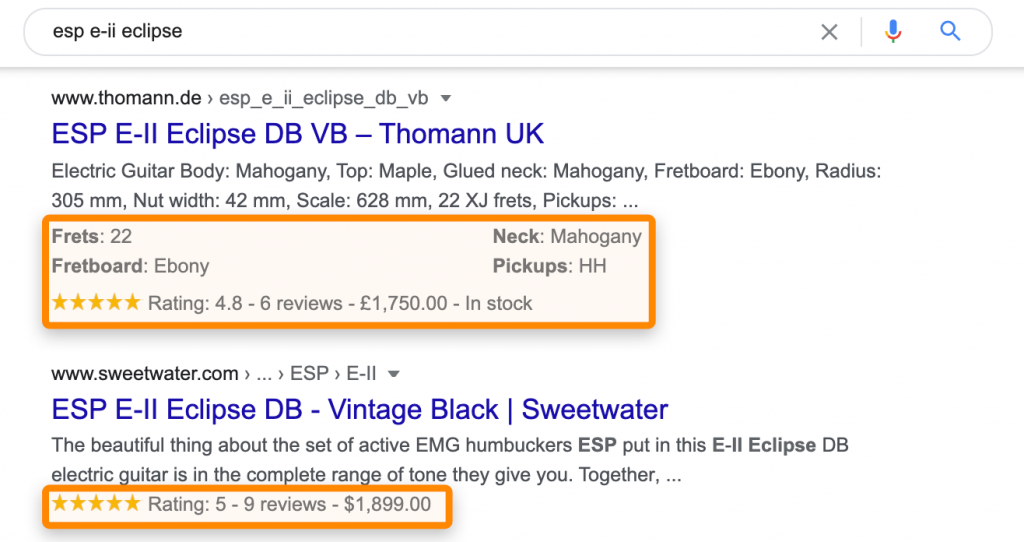In the ever-changing digital marketing landscape, SEO has become a popular online advertising strategy to build brand presence and stay ahead of the competitors. With over a billion searches conducted every day on Google, ranking at the top search results can help you boost click-through rates and maximize conversions.
As per several researches, it is proven that websites on the top get 42% of the traffic, the second gets 11% and third only gets 8% traffic. Hence, website owners are increasingly opting for SEO practices to get featured on the first SERPs.
Google Algorithms are evolving constantly with the changing consumer demands and expectations. To provide best user experience and engage clients at the earliest, companies are now deploying structured data into their SEO strategies.
Structured data analysis is found helpful for creating enhanced search results leading to more clicks and higher site traffic. In this article, we will be delving deep on the role of structured data, its benefits, testing tools and much more.
Page Contents:
What is Structured Data?
Structured data, also known as Schema Markup is a standardized code format that makes it easier for search engines to crawl and organize the page content and display rich snippets in the search results. These are commonly visible in the search results of books, movies, products and specific niche such as recipe blogs, news websites, online shopping stores, etc.
Rich results are standard search results that combine addition details along with the site link and description. They are visually appealing than the usual results with extra details such as site ratings, reviews, price range, product availability and other crucial information related to the type and niche of the site.
The primary purpose of structured data checker is to organize your website enabling Google crawlers in understanding and categorizing the page content. It is basically a tool that helps you communicate specific information about a webpage to Google, which uses the information to display rich results with enticing details and images.
Schema.org contains all the structured markup codes supported by the search engines. You can use Schema.org to find the markup code specific to your product and industry. For adding the code, you simply need to copy the code from the site and add it to your site after customizing it as per your business requirements. Google supports JSON-LD, Microdata, RDFa in which JSON-LD is the preferred format.
Structured Data Examples
Structured Data Types
Structured data is of following types:
- Carousel
- Corporate contact
- Course
- Breadcrumb
- Book
- Article
- Critic review
- Dataset
- Event
- Aggregate rating
- Fact check
- FAQ
- How-to
- Job posting
Must use Structured Data Types for Blog, Organization, Ecommerce, Local Business
The usage of structured data markup depends on the type of your website, its niche and the current level of competition in the industry. Adding schema markup code is necessary for sites and blogs publishing content related to food, cooking, recipes, etc. It is because when a user searches for a recipe; Google algorithms display only those results with structured data details such as cooking time, ingredients, reviews and ratings.
Also, for local-businesses, including a schema code can help you improve your website’s relevance for queries targeted to local businesses thereby driving more site traffic in the SERPs.
Below is the list about the structured data types used for blog, organization, ecommerce and local businesses.
Blog: Schema markup recommended for Blog Post Optimization is Blog and BlogPosting markup. This can be added via a WordPress plugin or a Schema App Editor. Below is an example of schema markup for BlogPosts.
Organization: For companies, organizations, corporations, it is recommended to use Organization type schema markup. Below is an example of schema markup for Organization.
Ecommerce Business: Structured data is important for Ecommerce sites to convey Google information about the products and services. The recommended Schema types for Ecommerce Business are Product Type, Offer Type, ImageObject Type and Action Type. Below is an example of schema markup for Ecommerce Business.
Local Business: Businesses targeting specific locations should incorporate LocalBusiness type schema markup to the websites. Below is an example of schema markup for Local Business.
Structured Data Benefits (Why to use)?
Structured Data for website enables you to rank higher in search results by displaying rich and featured snippets. It helps Google in gaining a better understanding of the page content by providing clear and relevant snippet results. Specific rich results attract more clicks leading to a greater brand awareness and higher ranking in the SERPs.
Google uses structured data checker from your site content to deliver the additional details in the search results. With the use of schema markup code, you can improve user experience and make the search results much more relevant and valuable.
Some of the benefits of incorporating structured data code in your site are:
- Enhanced search results: Proper application of Schema code makes your site eligible to be displayed in the form of a rich snippet at the top of search engine result page. The usage of structured data enhances your site’s appearance in the Google search results by enriching it with additional details such as price, reviews and ratings.
- Boost in rankings: Using schema markup code in your site helps Google in better understanding the site content thereby providing relevant search results matching the user’s search query. Enriched search results with additional details can help you boost your site ranking and obtaining topmost position in the SERPs.
- High CTR: Structured data gives your site a creative look with images, reviews, ratings leading to high click-through rate. As people prefer search results that are visually appealing, adding schema markup code makes it easy to capture readers’ interest which in turns drives more traffic. Thus, it is a useful tool to maximize your brand presence in the Google search results.
- Preview the page for users: Structured data can help you provide a better user experience and add more value to it. Readers get a preview of the webpage which provides vital information directly at the SERP page itself. This helps them in deciding whether to click on the site link or not. The usage of structured data code signals Google that the webpage is valuable and relevant to the search query which in turn, leads to more clicks and higher rank in the search results.
- Ads Automation: Using structured data, you can create customized Google Ads relevant to your site. Keywords used in the website’s structured data helps in creating customizable advertisements of the website automatically. After adding the target keywords in the structured data, you need to place those keywords in the settings. This will display your site ads in the Google SERPs based on the keyword relevancy.
Structured Data Testing Tools
This tool identifies the issues with structured data, helps to resolve them and provides accurate insights about the webpage data. The testing tools make it easy to detect and rectify the errors in the site’s schema. Here, are some of the most commonly used Structured Data Testing tools:
Google’s Structured Data Testing Tool: It is a simple-to-use tool that checks the structured data code in the JSON-LD, RDFa and Microdata formats. The tool will check for data code and flag errors once the website URL or code snippet is entered. Google’s Structured Data Testing Tool even supports checking of different data fields such as organization name, type, URL and other information. Google recommends the use of this tool during your site development phase.
Yandex Structured Data Validator: Similar to the Google’s Structured Data Testing Tool, it is another free structured data testing tool that inspects the markup of your site. This tool supports the testing of structured data in all the common formats such as OpenGraph, Microdata, RDF, and schema.org.
Bing Markup Validator: It is a structured data testing tool for Bing and is a part of Bing Webmaster Tools. It is used to verify structured data in the RDFa, JSON-LD, OpenGraph and micro formats. This validation tool is free to use and can be accessed by clicking on Diagnosing and Tools in the search page. But, to use this tool, you need to login and add your site to validate the structured data code.
SEO SiteCheckup: It is a structured data testing tool with a range of site analysis tools and SEO optimization features. In addition to checking schema usage, this tool evaluates the site for SEO issues such as page load speed, URL redirects, nested tables, broken links, mobile responsiveness, etc. You can upgrade to the premium plan to use the tool without any restrictions.
Structured Data Linter: It is a free structured data testing tool that helps to verify structured data present in webpages and display enhanced search results. It provides snippet visualization as well as limited vocabulary validations. You can upload a file, paste the site URL or enter the code to check the structured data. At present, this tool does not support micro formats.
In addition to the above tools, you can use JSON-LD Playground, RDF Translator and Merkle’s Schema Markup Generator to test your site’s structured data.
Common Structured Data Errors
Errors are bound to occur at the time of adding structured data to a site. It is crucial to find these errors as it may negatively impact the site’s On-Page SEO performance and ranking. Hence, it is suggested to discover errors in your website and take measures to rectify them as early as possible. Below is a list of common structured data errors and how to fix them.
Structured data invisible in pages: It is required to have structured data visible on your webpages so that search engines are able to read and rank those pages in the search results. Example, if you want to showcase your customer review ratings on the rich snippets then you need to add the review ratings in the webpage content as well. Placing the review details in the site’s code section and not displaying in the page content is misleading and prevents the page to be ranked at the top of the SERP.
How to fix the error: To rectify this error, it is suggested to display content on your site that you want to be showcased in the rich results and modify the schema code to showcase the page content.
Spam in Structured Markup: This error can occur due to the use of incorrect data in the schema markup code that is wrongly interpreted by Google Algorithms. Examples include showcasing reviews that are actually not visible on your site, listing multiple products in the markup that contains only one product, repetitive or wrong classification of webpages, etc.
How to fix the error: To resolve this error, you need to check separate site codes and sections and test them using a structured data testing tool or rich text tool. You may locate errors such as incorrect value type, parsing error, value missing, invalid element, etc. Once you find that the issue is resolved at your end you can send a reconsideration request to Google so that it can recrawl and verify that the issue has been fixed.
Unparsable Structured Data: This error is related to the sematic or spelling error in your structured data code.
How to fix the error: Enter the page URL into the Structured Data Tool to get the specific line where the error is located. Once you are confirmed that the error has been rectified, you can click on your Google Search Console account and select the ‘validate fix’ button to omit the page from the list of affected pages.
How Serpok helps in Structured Data Optimization?
Structured data is not just useful for the search engines but also for the users. Implementing structured data into your site enables you to enrich your search results thereby capturing readers’ attention. Supplement your SEO efforts by adopting structured data in your site. Engage clients and expand your business outreach with creative rich snippets.
Choose Serpok services for structured data optimization. With an extensive range of SEO services and SERP checker features, Serpok has become a trusted choice to grow your business and expand online presence. Gain a competitive edge and drive site traffic with our super affordable plans and packages. Sign up now and take your SEO campaign to the next level.
Also you can check: SERP Snippet Optimization







